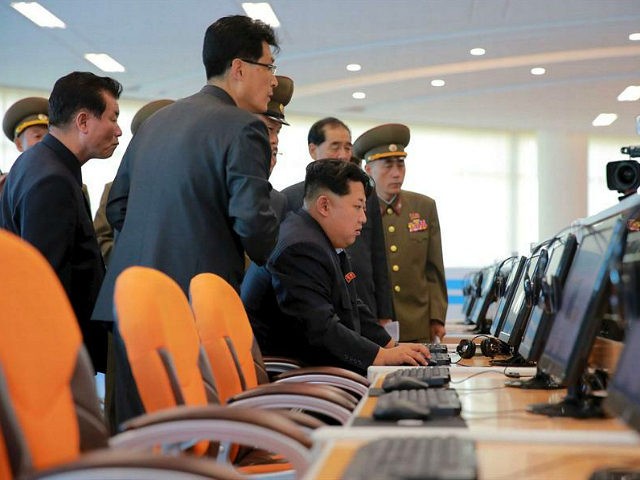In a totally unexpected development, the defection of a high-level North Korean official has caught both North Korea and the U.S. by surprise days before the yet-to-be-scheduled meeting between President Donald Trump and dictator Kim Jong-un.
Its impact on negotiations to end Pyongyang’s nuclear program remains to be seen.
If Pyongyang delays, it may well be due to an advantage Trump will have gained beforehand. If so, the advantage will be eerily similar to one President John F. Kennedy attained over the Soviets during the 1962 Cuban Missile Crisis negotiations.
Tipped off earlier by a spy working for the U.S. in Moscow that the Soviets were deploying nuclear missiles to Cuba, U.S. Navy ships began patrolling the waters off the island, preparing to intercept additional Soviet vessels en route to bring missiles to the island nation. As Kennedy and his Soviet counterpart, Premier Nikita Khrushchev, stared eyeball-to-eyeball in a game of nuclear poker, the world appeared to be on the brink of war.
But if Kennedy were to force Khrushchev to blink first, he needed to know what cards the Soviet leader was holding. Kennedy needed to know if the missiles photographed on launchers were operational and guidance systems functioning.
For this critical intelligence, Kennedy turned to his spy in Moscow, who was not an American but a colonel in the Soviet military intelligence (GRU): Oleg Penkovsky. Getting the intelligence back to Washington in a timely manner, however, risked Penkovsky’s identity being uncovered.
Knowing the risk, Penkovsky sent Kennedy the answers he needed. Now knowing the missiles were not operational, the President could demand Khrushchev remove them. Kennedy negotiated a quid-pro-quo with the Soviets (removing missiles in Turkey) so they would not lose total face. Later, however, the Soviets were able to determine Penkovsky’s identity, for which he was brutally executed. The means of execution, if true, only underscores the inhumanity of which humanity is capable. Tied down on a slab, he was allegedly slowly inserted into a raging furnace fire, feet first to draw out the pain. The execution was witnessed by others to get the message out as to the fate awaiting traitors. While an unsung hero of the Cuban Missile Crisis, Penkovsky ultimately paid a heavy personal price helping to avoid nuclear war.
This brings us to what recently happened in North Korea. Kim Jong-un received the unpleasant news in February that a high-ranking official had defected, not only taking with him a large amount of cash but, more importantly, a treasure trove of nuclear secrets. He apparently fled to England but could be anywhere in Europe or, even possibly, the U.S. Undoubtedly, the documents he had with him are eagerly being translated and shared with U.S. intelligence agencies. Kim Jong-un knows whatever the documents contain will give Trump an advantage as far as what demands to make of Kim at the talks.
The defector, only identified as “Mr. Kang,” is believed to be a colonel and senior counter-espionage official. He defected while in China, disappearing on February 25th from a facility operated by both the North Korean and Chinese governments, reportedly serving as an office for the former’s hackers working in China. It is said Kang was responsible for getting information for the North’s nuclear program to scientists.
Kang must not have had much concern about getting caught as he also is said to have taken with him a counterfeit machine used to print U.S. currency.
Based on Kang’s knowledge alone and, thus, the intelligence he could provide the U.S. and its allies, Kim, reportedly, has dispatched a ten-man hit squad to locate and execute Kang. It is an act Kim has no reluctance to do as evidenced by the execution he is believed to have ordered last year of his half-brother while he was in an airport terminal in Malaysia.
The hit squad, undoubtedly, has motivation to be successful as their failure would probably result in their own execution upon returning to North Korea.
While there are some espionage similarities between the Cuban Missile Crisis and this incident, there is one major difference concerning the motivation of the two colonels involved. Colonel Penkovsky’s motivation was ideological in nature; Colonel Kang’s is believed to be financially-driven. Apparently, evidence was discovered in North Korea that Kang had been taking money while out of the country. Rather than return home to plea for his life, he opted to go rogue, leaving his family behind. Unfortunately, it is they from whom a heavy price will undoubtedly be extracted.
Defections are somewhat common in North Korea, a sufficient number over the past few decades probably to populate a small country. It is estimated there have been about 30,000 defections. But those by high-level officials, who enjoy living the high life of the elites, are rare.
Kang’s defection offers us a great opportunity to learn much more about North Korea’s nuclear program. Coming on the heels of Israel’s release of over 100,000 pages on Iran’s secret nuclear arms program it surreptitiously smuggled out of that country, both caches of documents should prove most illuminating – not only about their own individual programs but about their contributory efforts to arm two members of the Axis of Evil with nuclear weapons.
Lt. Colonel James G. Zumwalt, USMC (Ret.), is a retired Marine infantry officer who served in the Vietnam war, the U.S. invasion of Panama and the first Gulf war. He is the author of “Bare Feet, Iron Will–Stories from the Other Side of Vietnam’s Battlefields,” “Living the Juche Lie: North Korea’s Kim Dynasty” and “Doomsday: Iran–The Clock is Ticking.” He frequently writes on foreign policy and defense issues.

COMMENTS
Please let us know if you're having issues with commenting.